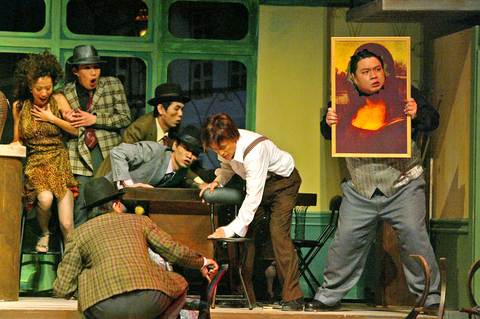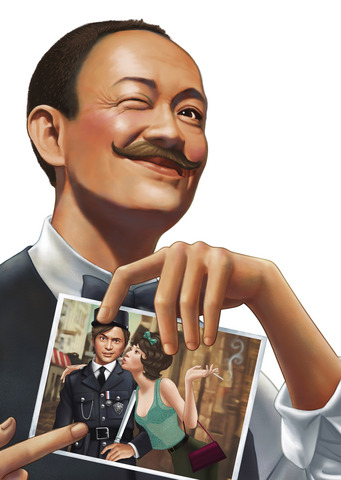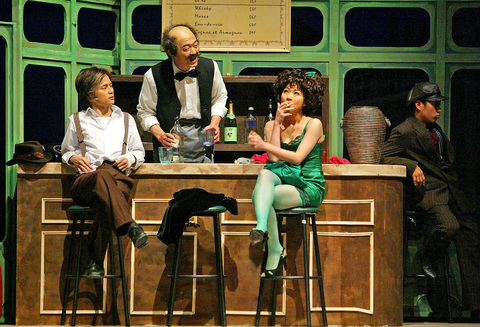Godot Theater (果陀劇場) seems to work in pairs. Having staged two Peter Shaffer plays back in 2001, the theater troupe has investigated the comic oeuvre of Billy Wilder over the past year first with The Apartment, performed in June of last year, and tonight its production of Irma la Douce will hit the stage at the National Theater.
Originally a French musical by Alexandre Breffort, the English-language version premiered in London's West End in the summer of 1958 and ran for more than 1,500 performances. The musical moved on to Broadway in 1960 and was an immediate smash winning Elizabeth Seal the 1961 Tony Award for Best Actress in a Musical. It ran for 525 performances.
The movie version, loosely based on the original musical and adapted by Wilder, tells the story of a naive beat cop named Nestor Patou on the streets of Paris who busts a whorehouse close to where prostitute Irma la Douce plies her trade. Unbeknownst to the innocent Patou, his boss is enjoying the services of the

PHOTOS COURTESY OF GODOT THEATER
establishment when the unauthorized bust goes down and eventually loses his job.
Obsessed with the injustice of losing his job, Patou returns to the Rue Casanova where he befriends la Douce at Chez Moustache, a cafe of questionable repute named after the owner who sports a prominent mustache. While in the bar, the hapless Patou luckily kills off la Douce's pimp and, like the original musical, takes on the role of her principal client (through a disguise) by working long hours during the day, and pimping at night.
The romantic comedy is mainly about how passion and jealousy can lead to bloodshed and how an upright policeman like Patou can suddenly lose his moral scruples due to circumstance. The role of Patou will be played by Bacy Tang (唐從聖) — the great imitator of Taiwanese politicians — and la Douce is played by Ting Hsiao-chin (丁小芹).

To lighten the moral undertones of the play, Godot founder James Liang (梁志民) adapted a script that emphasizes the moral ambiguity of the cafe owner, played by veteran comic actor Chin Shih-jie (金士傑).
"We chose Chin to play the role of cafe owner because of his comic genius," said Sean Yeh (葉向華), Godot Theater's promotional manager.
"The role requires versatility because the actor has to believe in the twisted and comic logic of the cafe owner."

Like the movie version, the script adapted by Liang dispenses with the musical numbers but adds a chorus as a tribute to the original musical and to offer moral balance to the prostitute-filled streets of 1960s Paris.
To add verisimilitude to the play, stage designer Li Shih-chi (黎仕祺) constructed a set that recreates the seedy streets of the city of love. According to Yeh, the set will transport the audience from contemporary Taipei to raunchy Paris.
He adds the passion, jealousy and violence that are hallmarks of both the musical and movie are well adapted to this stage version, which will climax in a denouement that will leave audiences surprised and satisfied.

April 28 to May 4 During the Japanese colonial era, a city’s “first” high school typically served Japanese students, while Taiwanese attended the “second” high school. Only in Taichung was this reversed. That’s because when Taichung First High School opened its doors on May 1, 1915 to serve Taiwanese students who were previously barred from secondary education, it was the only high school in town. Former principal Hideo Azukisawa threatened to quit when the government in 1922 attempted to transfer the “first” designation to a new local high school for Japanese students, leading to this unusual situation. Prior to the Taichung First

The Ministry of Education last month proposed a nationwide ban on mobile devices in schools, aiming to curb concerns over student phone addiction. Under the revised regulation, which will take effect in August, teachers and schools will be required to collect mobile devices — including phones, laptops and wearables devices — for safekeeping during school hours, unless they are being used for educational purposes. For Chang Fong-ching (張鳳琴), the ban will have a positive impact. “It’s a good move,” says the professor in the department of

On April 17, Chinese Nationalist Party (KMT) Chairman Eric Chu (朱立倫) launched a bold campaign to revive and revitalize the KMT base by calling for an impromptu rally at the Taipei prosecutor’s offices to protest recent arrests of KMT recall campaigners over allegations of forgery and fraud involving signatures of dead voters. The protest had no time to apply for permits and was illegal, but that played into the sense of opposition grievance at alleged weaponization of the judiciary by the Democratic Progressive Party (DPP) to “annihilate” the opposition parties. Blamed for faltering recall campaigns and faced with a KMT chair

Article 2 of the Additional Articles of the Constitution of the Republic of China (中華民國憲法增修條文) stipulates that upon a vote of no confidence in the premier, the president can dissolve the legislature within 10 days. If the legislature is dissolved, a new legislative election must be held within 60 days, and the legislators’ terms will then be reckoned from that election. Two weeks ago Taipei Mayor Chiang Wan-an (蔣萬安) of the Chinese Nationalist Party (KMT) proposed that the legislature hold a vote of no confidence in the premier and dare the president to dissolve the legislature. The legislature is currently controlled